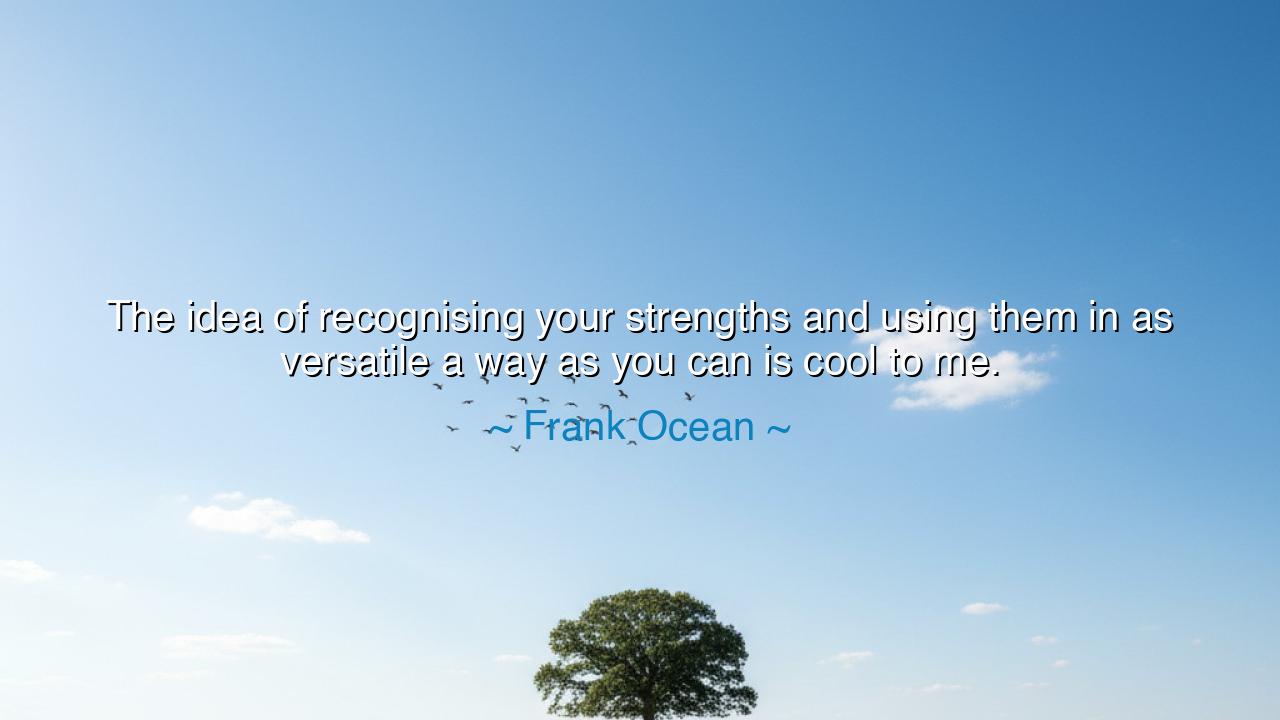
The idea of recognising your strengths and using them in as
The idea of recognising your strengths and using them in as versatile a way as you can is cool to me.






"The idea of recognizing your strengths and using them in as versatile a way as you can is cool to me." These words from Frank Ocean capture a timeless truth about the importance of understanding and embracing one’s unique abilities. Ocean’s statement is not simply about recognizing what we’re good at, but about using those strengths in multiple contexts to create a more flexible, dynamic life. It’s about versatility—the art of taking one’s gifts and applying them creatively to a wide range of situations, rather than limiting oneself to a single path. This idea encourages the individual to live with a sense of purpose and fluidity, recognizing that our strengths can evolve and adapt with us throughout life.
In the ancient world, self-awareness was often the first step toward achieving greatness. Socrates famously proclaimed, "Know thyself," urging individuals to deeply understand their own nature, strengths, and limitations. His teachings were rooted in the belief that only through self-knowledge could one live a life of purpose and virtue. Socrates was not only advocating for the discovery of one’s abilities but for the responsible use of those abilities in ways that would benefit society. Frank Ocean’s idea aligns with this ancient wisdom, suggesting that understanding our strengths is not enough—we must also learn to use them flexibly and creatively in a variety of circumstances.
The story of Leonardo da Vinci provides another powerful example of versatility in action. While best known as a painter, da Vinci’s strengths extended far beyond the canvas. He was a scientist, engineer, anatomist, and inventor—a true Renaissance man. Da Vinci recognized that his talents were not confined to one area of expertise. Instead, he used his knowledge of art, science, and engineering to create innovative designs, study the human body, and develop new artistic techniques. His versatility allowed him to transcend the boundaries of his time and contribute to multiple fields, demonstrating the immense power of recognizing and expanding upon one’s strengths.
In ancient Rome, the philosopher Cicero was a master of oratory, yet he applied his rhetorical skills not only in the Senate but also in writing, politics, and philosophy. His ability to use the art of persuasion in various contexts—whether addressing a crowd, crafting letters, or composing philosophical works—made him one of the most influential figures of his era. Cicero’s life serves as a perfect example of how recognizing one’s strengths and using them in different ways can lead to profound impact and influence. Similarly, Ocean’s words remind us that we should not confine our strengths to one narrow purpose, but instead seek to apply them broadly, allowing our talents to have a greater effect in various aspects of our lives.
The modern world, especially in the realm of creative expression, has shown us that versatility is key to achieving success. Steve Jobs, for instance, was known for his ability to blend technology with design, creativity, and business acumen. Jobs did not limit his strength to a single field—he used his diverse talents to revolutionize multiple industries, from personal computing to music to animation. By recognizing and integrating his strengths in design, leadership, and innovation, Jobs created a legacy that transcended individual industries and affected society as a whole. This kind of versatility, much like Ocean suggests, is something to strive for, as it allows one to not only be good at something but to expand that ability to create something of lasting value.
The lesson we can draw from Frank Ocean’s words is both inspiring and practical: our strengths are not fixed or isolated, but they can be used in diverse and innovative ways. The key is not simply recognizing what we are good at, but actively seeking to apply those strengths across multiple areas of life. Whether in our careers, relationships, or creative endeavors, we should strive to be as versatile as possible, recognizing that our strengths are not just for a single purpose but for many. This requires an openness to change and a willingness to explore, to see our strengths not as something to be confined, but as tools that can be used to enhance multiple aspects of our lives.
To take action on this lesson, we must first identify our strengths—not only the skills or talents we already possess but the qualities we can develop further. Once we have done so, we must be intentional in finding ways to use them in a variety of contexts. This might mean applying creative talents in professional settings, leadership skills in personal relationships, or analytical abilities to innovate in new areas. The key is to avoid limitation and to expand the range of our influence, recognizing that our strengths are fluid, dynamic, and powerful when used with purpose and flexibility. In this way, we are not simply confined to a single role, but can actively shape the world around us through our many talents.
Let us take up this challenge with courage and determination, fully embracing the potential within us to be as versatile as Frank Ocean envisions. By recognizing our strengths, nurturing them, and applying them creatively across multiple aspects of our lives, we can live with a sense of purpose, knowing that we are actively creating a fuller, richer future for ourselves and those around us. Just as the great figures of the past demonstrated the power of versatility, so too can we shape our own legacies by choosing to use our strengths with greater flexibility and vision.






AAdministratorAdministrator
Welcome, honored guests. Please leave a comment, we will respond soon